Unit 5 Unit 5 Languages Around the World Listening and Speaking课件(共24页,内嵌音视频)
文档属性
| 名称 | Unit 5 Unit 5 Languages Around the World Listening and Speaking课件(共24页,内嵌音视频) |  | |
| 格式 | pptx | ||
| 文件大小 | 64.3MB | ||
| 资源类型 | 教案 | ||
| 版本资源 | 人教版(2019) | ||
| 科目 | 英语 | ||
| 更新时间 | 2025-02-27 19:13:13 | ||
图片预览


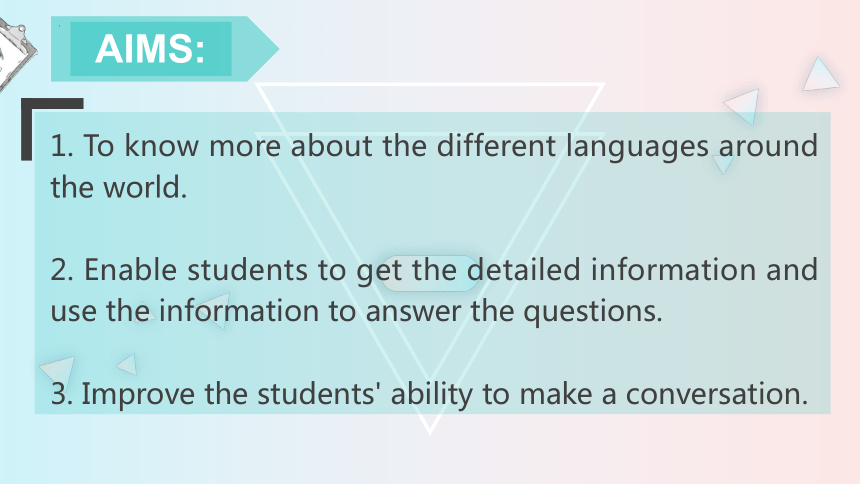
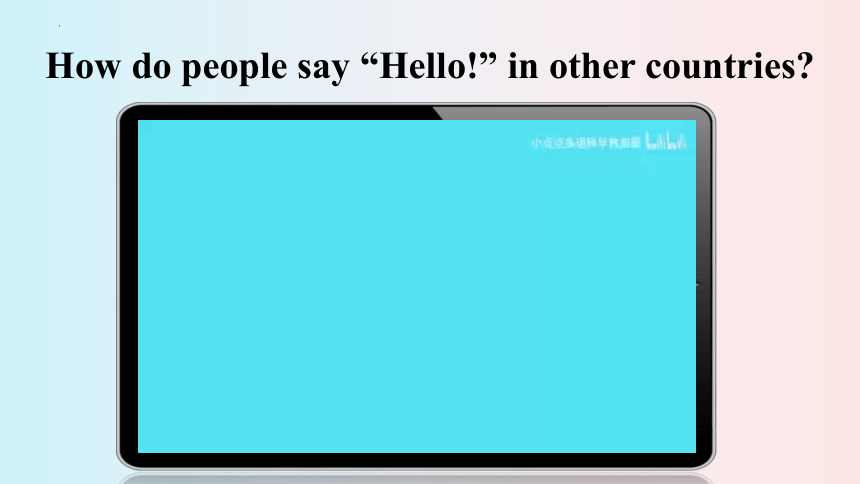
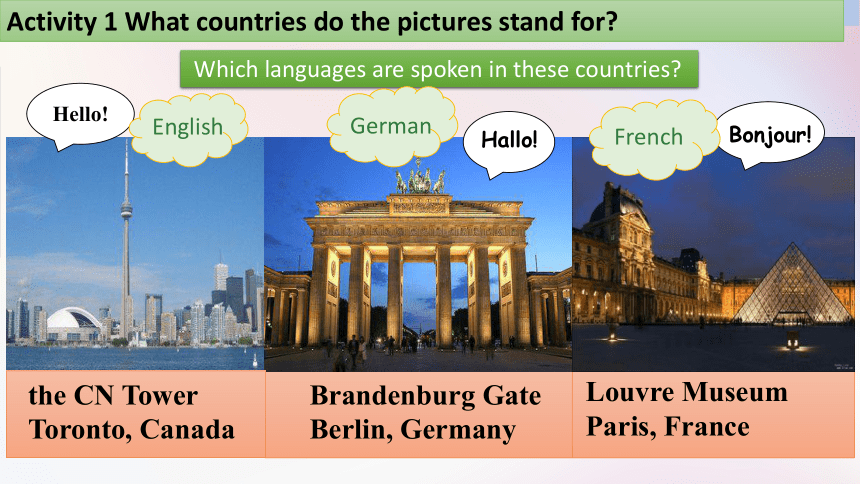
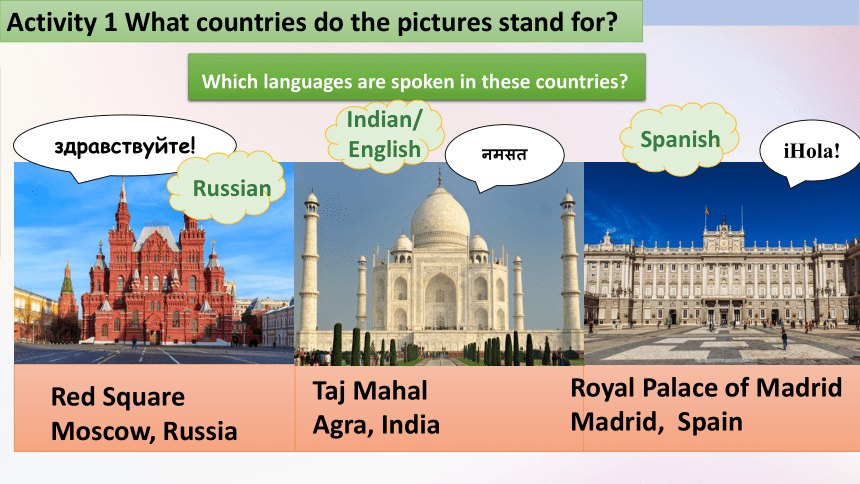
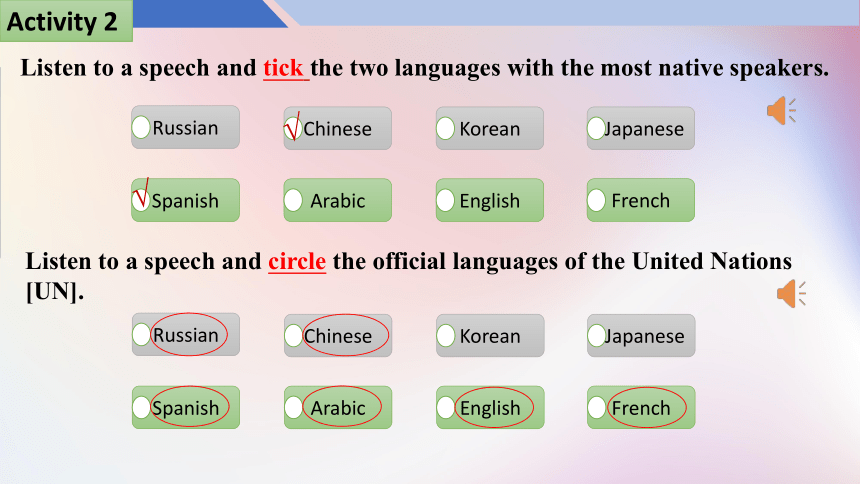
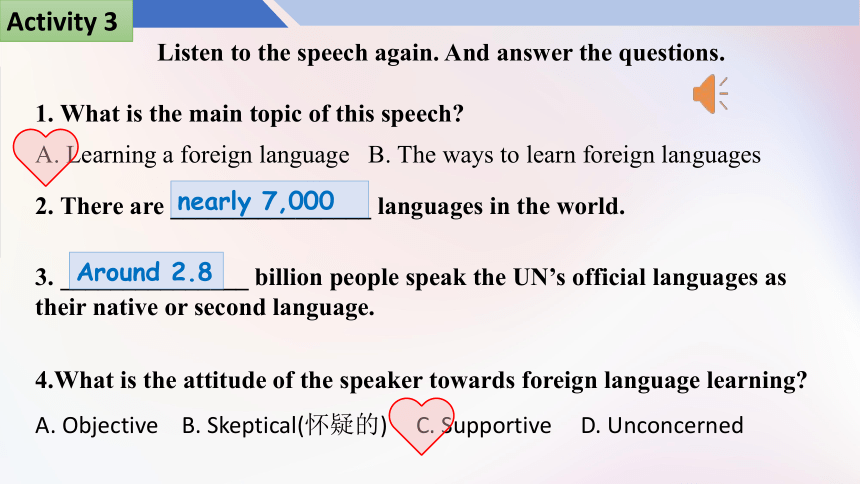
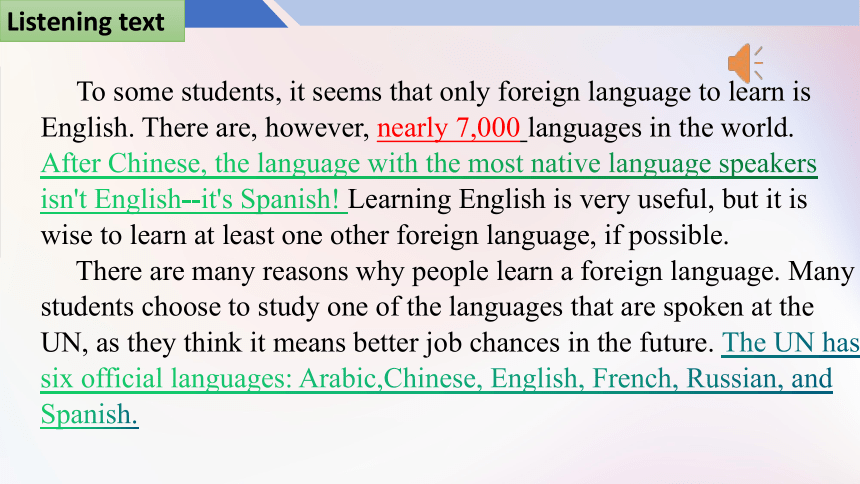
文档简介
(共24张PPT)
One language sets you in a corridor for life. Two languages open every door along the way.
——Frank Smith
一门语言能带你进入人生旅途,两门语言则为你开启人生旅途中的所有大门。
1. To know more about the different languages around the world.
2. Enable students to get the detailed information and use the information to answer the questions.
3. Improve the students' ability to make a conversation.
AIMS:
How do people say “Hello!” in other countries
Which languages are spoken in these countries
Brandenburg Gate Berlin, Germany
Louvre Museum
Paris, France
Hello!
Hallo!
Bonjour!
the CN Tower Toronto, Canada
Activity 1 What countries do the pictures stand for
English
German
French
Which languages are spoken in these countries
Red Square Moscow, Russia
Taj Mahal
Agra, India
Royal Palace of Madrid Madrid, Spain
здравствуйте!
iHola!
Activity 1 What countries do the pictures stand for
Russian
Indian/English
Spanish
Listen to a speech and tick the two languages with the most native speakers.
Russian
Chinese
Korean
Japanese
Spanish
Arabic
English
French
√
√
Activity 2
Listen to a speech and circle the official languages of the United Nations [UN].
Russian
Chinese
Korean
Japanese
Spanish
Arabic
English
French
Activity 3
Listen to the speech again. And answer the questions.
1. What is the main topic of this speech
A. Learning a foreign language B. The ways to learn foreign languages
2. There are ________________ languages in the world.
3. _______________ billion people speak the UN’s official languages as their native or second language.
4.What is the attitude of the speaker towards foreign language learning
A. Objective B. Skeptical(怀疑的) C. Supportive D. Unconcerned
nearly 7,000
Around 2.8
To some students, it seems that only foreign language to learn is English. There are, however, nearly 7,000 languages in the world. After Chinese, the language with the most native language speakers isn't English--it's Spanish! Learning English is very useful, but it is wise to learn at least one other foreign language, if possible.
There are many reasons why people learn a foreign language. Many students choose to study one of the languages that are spoken at the UN, as they think it means better job chances in the future. The UN has six official languages: Arabic,Chinese, English, French, Russian, and Spanish.
Listening text
They are spoken by around 2.8 billion people as their native or second languages.
Some students, though, choose to study a language because of family or friends. One American girl chose to learn Danish because her grandparents were from Denmark. When she was little, her grandpa used to read letters to her in Danish from their relatives in Denmark. Another young lady started learning French because she had several friends from African countries where French is spoken.
What do you think Which other language would you choose to study and why
Listening text
Activity 4
Listen to the speech again. What do the italicised(斜体的) words refer to in the sentences
Reference
Pronouns(it, they, she, etc.) refer to sth or sb mentioned earlier. Pay attention to the context
of words to help you understand what the pronouns refer to.
1.They think it means better job chances in the future.
2.They are spoken by around 2.8 billion people...
“They” means students;
and “it” means a foreign language.
“They” means six UN official languages--- Arabic, Chinese, English, French, Russian, and Spanish.
Listening text
1. ①There are many reasons why people learn a foreign language.
②Many students choose to study one of the languages that are spoken at the UN.
③As they think it means better job chance in the future.
2. ①The UN has six official languages:Arabic, Chinese, English, French, Russian and Spanish.
②They are spoken by around 2.8 billion people as thier native or second languages.
Activity 5 Pair-work
Discuss which other language(s) you want to learn and why.
I like watching Japanese cartoons, so I’d like to learn Japanese.
Perhaps I should learn French. I think it sounds beautiful, and I know it’s used in many countries and international organisations around the world.
My father is doing business with Russians, I’d like to learn Russian so I can help him in the future.
Activity 5 Pair-work
Discuss which other language(s) you want to learn and why.
Discuss which other language(s) you want to learn and why.
Example:
A: What language do you want to study
B: I really want to study French. I think that the French language sounds beautiful.
A: Why Do you want to go to France some day
B: Yes, I’d love to. Also, French is used by many international organizations around the world. Do you know that FIFA’s full name is in French
A: Oh, I remember that. But I don’t know how to pronounce it.
Activity 5 Pair-work
Sample dialogue
A: What language do you want to study
B: I really want to study...I think ...
A: Why ...
B: Yes, I'd love to. Also, ...
A:Oh, I remember that. But I don't know.....
Pronunciation
schedule hostile either address
direct laboratory advertisement shone
1. Work in pairs. Read the words to each other and see if you pronounce them differently.
schedule hostile either address
[ edju l/ [ h sta l] [ a ] [ dres]
[ sked ul] [ hɑ stl] [ i r] [ dres]
direct laboratory advertisement shone
[da rekt] [l b r tri] [ d v t sm nt] [ n]
[d rekt] [ l br t ri] [ dv r ta zm nt] [ n]
2. Listen and pay attention to how the speakers pronounce them.
Pronunciation
Pronunciation
3. Listen to the paragraph read by two different speakers. Which speaker has a British accent and which has an American accent
English is a crazy language. There is no egg in eggplant nor ham in hamburger; neither apple nor pine in pineapple. English muffins weren't invented in England or French fries in France. Sweetmeats are candies while sweetbreads, which aren't sweet, are meat.... We find that quicksand can work slowly, boxing rings are square, and a guinea pig is neither from Guinea nor is it pig. And why is it that writers write.... but hammers don't ham (Richard Lederer)
British accent (woman)
American accent (man)
“茄子”里没有egg却偏偏叫做eggplant,
“菠萝”里没有apple却偏偏叫做pineapple; [ pa n pl]
“糖果,果脯, 蜜饯”不是肉偏偏叫做sweetmeat,
“(食用的小牛或养的)胰脏”是肉偏偏叫做sweetbread;
“淡水”不是甜的偏偏叫做sweet water;
“厕所”不是用来休息的,偏偏叫做restroom;
“炸薯条”不是法国发明的,偏叫做French fries;
“气管炎/佝偻病”并非英国特有,偏叫做English disease
quicksand 流沙 boxing ring 拳击场地
guinea pig [ ɡ ni p ɡ] 豚鼠;天竺鼠 Guinea [ ɡ ni] n. 几内亚
hammer [ h m (r)] n. 锤子,榔头 ham [h m] v. 过火地表演
Enjoy a short video
Thank you!
One language sets you in a corridor for life. Two languages open every door along the way.
——Frank Smith
一门语言能带你进入人生旅途,两门语言则为你开启人生旅途中的所有大门。
1. To know more about the different languages around the world.
2. Enable students to get the detailed information and use the information to answer the questions.
3. Improve the students' ability to make a conversation.
AIMS:
How do people say “Hello!” in other countries
Which languages are spoken in these countries
Brandenburg Gate Berlin, Germany
Louvre Museum
Paris, France
Hello!
Hallo!
Bonjour!
the CN Tower Toronto, Canada
Activity 1 What countries do the pictures stand for
English
German
French
Which languages are spoken in these countries
Red Square Moscow, Russia
Taj Mahal
Agra, India
Royal Palace of Madrid Madrid, Spain
здравствуйте!
iHola!
Activity 1 What countries do the pictures stand for
Russian
Indian/English
Spanish
Listen to a speech and tick the two languages with the most native speakers.
Russian
Chinese
Korean
Japanese
Spanish
Arabic
English
French
√
√
Activity 2
Listen to a speech and circle the official languages of the United Nations [UN].
Russian
Chinese
Korean
Japanese
Spanish
Arabic
English
French
Activity 3
Listen to the speech again. And answer the questions.
1. What is the main topic of this speech
A. Learning a foreign language B. The ways to learn foreign languages
2. There are ________________ languages in the world.
3. _______________ billion people speak the UN’s official languages as their native or second language.
4.What is the attitude of the speaker towards foreign language learning
A. Objective B. Skeptical(怀疑的) C. Supportive D. Unconcerned
nearly 7,000
Around 2.8
To some students, it seems that only foreign language to learn is English. There are, however, nearly 7,000 languages in the world. After Chinese, the language with the most native language speakers isn't English--it's Spanish! Learning English is very useful, but it is wise to learn at least one other foreign language, if possible.
There are many reasons why people learn a foreign language. Many students choose to study one of the languages that are spoken at the UN, as they think it means better job chances in the future. The UN has six official languages: Arabic,Chinese, English, French, Russian, and Spanish.
Listening text
They are spoken by around 2.8 billion people as their native or second languages.
Some students, though, choose to study a language because of family or friends. One American girl chose to learn Danish because her grandparents were from Denmark. When she was little, her grandpa used to read letters to her in Danish from their relatives in Denmark. Another young lady started learning French because she had several friends from African countries where French is spoken.
What do you think Which other language would you choose to study and why
Listening text
Activity 4
Listen to the speech again. What do the italicised(斜体的) words refer to in the sentences
Reference
Pronouns(it, they, she, etc.) refer to sth or sb mentioned earlier. Pay attention to the context
of words to help you understand what the pronouns refer to.
1.They think it means better job chances in the future.
2.They are spoken by around 2.8 billion people...
“They” means students;
and “it” means a foreign language.
“They” means six UN official languages--- Arabic, Chinese, English, French, Russian, and Spanish.
Listening text
1. ①There are many reasons why people learn a foreign language.
②Many students choose to study one of the languages that are spoken at the UN.
③As they think it means better job chance in the future.
2. ①The UN has six official languages:Arabic, Chinese, English, French, Russian and Spanish.
②They are spoken by around 2.8 billion people as thier native or second languages.
Activity 5 Pair-work
Discuss which other language(s) you want to learn and why.
I like watching Japanese cartoons, so I’d like to learn Japanese.
Perhaps I should learn French. I think it sounds beautiful, and I know it’s used in many countries and international organisations around the world.
My father is doing business with Russians, I’d like to learn Russian so I can help him in the future.
Activity 5 Pair-work
Discuss which other language(s) you want to learn and why.
Discuss which other language(s) you want to learn and why.
Example:
A: What language do you want to study
B: I really want to study French. I think that the French language sounds beautiful.
A: Why Do you want to go to France some day
B: Yes, I’d love to. Also, French is used by many international organizations around the world. Do you know that FIFA’s full name is in French
A: Oh, I remember that. But I don’t know how to pronounce it.
Activity 5 Pair-work
Sample dialogue
A: What language do you want to study
B: I really want to study...I think ...
A: Why ...
B: Yes, I'd love to. Also, ...
A:Oh, I remember that. But I don't know.....
Pronunciation
schedule hostile either address
direct laboratory advertisement shone
1. Work in pairs. Read the words to each other and see if you pronounce them differently.
schedule hostile either address
[ edju l/ [ h sta l] [ a ] [ dres]
[ sked ul] [ hɑ stl] [ i r] [ dres]
direct laboratory advertisement shone
[da rekt] [l b r tri] [ d v t sm nt] [ n]
[d rekt] [ l br t ri] [ dv r ta zm nt] [ n]
2. Listen and pay attention to how the speakers pronounce them.
Pronunciation
Pronunciation
3. Listen to the paragraph read by two different speakers. Which speaker has a British accent and which has an American accent
English is a crazy language. There is no egg in eggplant nor ham in hamburger; neither apple nor pine in pineapple. English muffins weren't invented in England or French fries in France. Sweetmeats are candies while sweetbreads, which aren't sweet, are meat.... We find that quicksand can work slowly, boxing rings are square, and a guinea pig is neither from Guinea nor is it pig. And why is it that writers write.... but hammers don't ham (Richard Lederer)
British accent (woman)
American accent (man)
“茄子”里没有egg却偏偏叫做eggplant,
“菠萝”里没有apple却偏偏叫做pineapple; [ pa n pl]
“糖果,果脯, 蜜饯”不是肉偏偏叫做sweetmeat,
“(食用的小牛或养的)胰脏”是肉偏偏叫做sweetbread;
“淡水”不是甜的偏偏叫做sweet water;
“厕所”不是用来休息的,偏偏叫做restroom;
“炸薯条”不是法国发明的,偏叫做French fries;
“气管炎/佝偻病”并非英国特有,偏叫做English disease
quicksand 流沙 boxing ring 拳击场地
guinea pig [ ɡ ni p ɡ] 豚鼠;天竺鼠 Guinea [ ɡ ni] n. 几内亚
hammer [ h m (r)] n. 锤子,榔头 ham [h m] v. 过火地表演
Enjoy a short video
Thank you!
